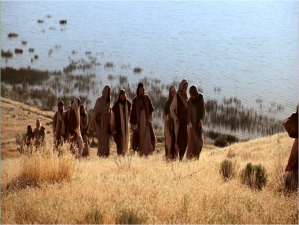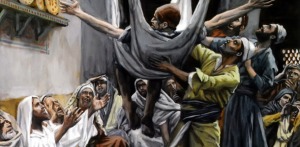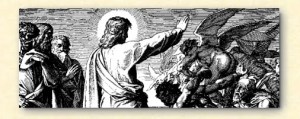And Jesus, full of the Holy spirit, returned from the Jordan and was led by the spirit in the wilderness for forty days, being tempted by the devil. (Luke 4:1-2)
Before that voice came from heaven, did the devil even know who he was?
Well, probably. Other voices had spoken: angels singing, old men and young maidens prophesying. The Devil, always a competent theologian, is also a keen observer. He probably watched the boy from Nazareth growing up like any other boy, subject to temptation like any other boy—yet without sin. Yet without sin—not even blameless Job could make that claim. But the baptism and the commissioning voice from heaven signal the first offensive move from the Almighty. Though he doesn’t yet know what They are up to, Satan must respond.
Important to note: he’s playing a defensive game, guarding the default. Sin is the easy way, the irresistible way; God’s victories thus far have all been scored in spite of it, not because of it. The “strong man” has been thwarted often but not defeated. Messiah is a new tactic and for all his acumen the Devil can’t figure it out. He is utterly contemptuous of humanity—so weak and gullible from Day One. If he were planning a strategy to defeat himself, he would never have cast his adversary in flesh. He’s seen the pathetic limits of flesh–seen it cower, tremble, boast, bray, shrink, rot, and decay, over and over and over—and even though he knows there’s something special about this body of flesh, he also senses a trembling edge, perhaps even a weakness that can be exploited. The three-in-one is divided. Somehow the Son has literally become the Son, peeled off from eternity and located in a particular place and time like any man.
Surely something can be done with this? It appears the Almighty is playing directly into Satan’s hands; rather than the steely shining likeness of one of those insufferable unfallen angels, the game is to be played with the equivalent of sticks and stones. All right, then . . . .
Perhaps Satan takes the steely shining form himself, as an angel of light. He finds the “Son of Man”  stumbling through the desert like one of the scapegoats turned loose on the Day of Atonement, those bleating, pitiful creatures dedicated to Azazel that his demons liked to torment mercilessly. The Man has been forty days and nights without food, and he looks it. Satan takes time to marvel: no mere appearance of starvation here. He’s really hungry. Maybe this will be easy: “I hear you are the Son of God. If so, you can surely turn these stones into loaves of bread and ease your hunger.”
stumbling through the desert like one of the scapegoats turned loose on the Day of Atonement, those bleating, pitiful creatures dedicated to Azazel that his demons liked to torment mercilessly. The Man has been forty days and nights without food, and he looks it. Satan takes time to marvel: no mere appearance of starvation here. He’s really hungry. Maybe this will be easy: “I hear you are the Son of God. If so, you can surely turn these stones into loaves of bread and ease your hunger.”
It’s the kind of trick Satan likes to do: swap this for that. Change substance to appearance. Magic, in other words—he’s an expert. The Man stares at the rocky terrain, and perhaps that’s a hungry look in his eyes. But not, perhaps, for bread. In the utter stillness a breeze begins to stir, a breeze with a voice that bends and shapes and begins to articulate. Very softly at first, then louder as more voices join in—tinny ones and fat ones, from the highest treble to the lowest base. With a start, Satan recognizes that the stones themselves are crying out: Hosannah! Blessed it he who comes in the name of the Lord! Hosannah! Blessed is he, blessed is he, blessed is—
“SILENCE!” he roars, flashing for a moment into his true, snarly, smoky essence.
A pained smile crosses the Man’s face. “Scripture says, ‘A Man does not live on bread alone, but on every word uttered by God.’” As if to chastise the Accuser, one last little voice pipes up, “Hosannah!”—its echo fading quickly in a final puff of wind.
All right; so it won’t be easy. He didn’t really expect it would be. Back in shining mode he claps his hands, bending space, bringing them to the pinnacle of the temple, the highest spot on Zion’s holy hill. He knows this place well, pierces its hypocrisy on a regular basis. Below them the priests and Levites go about their business, buying and selling and cheating the common folk while Pharisees beat their breasts and chant phony prayers. The Man’s face darkens as he bites his lip.
“Quite a show, isn’t it?” Satan remarks. “About as far from true worship as pigs from lambs. Your . . . your Father must be incensed, every day. Why don’t you put a stop to it? Make your entrance now as the Promised One, clear out the money changers and hypocrites and declare the Day of the Lord’s Favor. Leap down among them. Even though I sense a real weight and vulnerability about you, it’s impossible for you to be harmed. You know what Scripture says: He will set his angels to guard you, to bear you up—you won’t even scrape your foot.”
He says nothing at first. Then he raises his foot, and idly scratches his heel. Satan turns cold with the memory, as though hurled back there–to the garden where he scored his great victory. But the Almighty checked his gloating: He shall bruise your head, and you shall bruise his heel. He always wondered what that meant.
“Scripture also says, ‘You shall not tempt the Lord your God.’” The Man’s face, no longer convulsed with anger, sets as placidly as the moon.
Very well. Satan spreads his arms, gathering all time into them, and they launch into eternity. Now all the kingdoms of the world rise and fall below them: empires glitter and collapse to dust, palaces bloom like flowers, armies surge, masses bow. From this distance, it is glorious. “I’ll give you all this,” he says, his arms still spread. “Right here, right now, if you will worship me.”
Perhaps it’s a last, desperate gamble. It seems clumsy at best, tempting the Almighty to worship an obvious inferior. But what if the look on the Man’s face startles Satan himself—so hungry, so ravenous? He wants these kingdoms, these palaces and empires. But they are ultimately his! He made them, he owns them. All the heavenly beings know that, and the demonic ones too. So why doesn’t the Man just claim what is his? Why this masquerade, this parading around in human flesh?
While puzzling over the problem, Satan begins to sense an obstacle, a bump in the road. The Son of Man has obviously taken a great step down, from heaven to earth. What if he has to go even farther down? Suppose there’s an uncompleted step in the plan, something so appalling even the Son doesn’t fully grasp it. The Kingdom of Heaven is at hand, but Satan can offer a shortcut: Whatever it is you’re supposed to do, Son of Man, isn’t really necessary. You can complete your mission right now and stride into your kingdom with an emperor’s crown.
The Man clenches his fists, sets his face, and recites the Shema that every good Jewish boy knows by heart: “You shall worship the Lord your God and serve him only.”
Satan inwardly groans in disgust, but decides it was a pretty good day’s work. Enough for now. In a blink, they’re back in the wilderness where he recalls the sheeplike people of God wandering for forty years while he poked and prodded them every day. Good times! Forty years, forty days—yes, he sees the connection. It’s obvious the Man has completed some kind of test but a greater test lies ahead, and Satan will be there for it. We’re not done, he says, leaving his enemy exhausted and plastered to the desert floor like a rag.
As Matthew says, and behold, angels came and were ministering to him.
For the original post in this series, go here.
<Previous
Next>
 difference is not between real and illusion, but between “now” and now: a time bound by walls of circumstance, and a time set free. It’s like we’re living in the anteroom, or even the coat closet where we wait in rags and muddy boots. You can start taking those off now, he says; all your disappointments and deprivations are to be left here. Don’t mind the walls—anticipate the door. Are you poor, hungry, sad? A joyful feast waits behind that door. Do you come well-fed and expensively dressed? Those designer labels and fast cars are worthless in the Kingdom. There’s a whole other currency, didn’t you know? And your accolades and reputation won’t carry over. They speak a different language there; try to boast in your own achievements and all you will get are puzzled frowns.
difference is not between real and illusion, but between “now” and now: a time bound by walls of circumstance, and a time set free. It’s like we’re living in the anteroom, or even the coat closet where we wait in rags and muddy boots. You can start taking those off now, he says; all your disappointments and deprivations are to be left here. Don’t mind the walls—anticipate the door. Are you poor, hungry, sad? A joyful feast waits behind that door. Do you come well-fed and expensively dressed? Those designer labels and fast cars are worthless in the Kingdom. There’s a whole other currency, didn’t you know? And your accolades and reputation won’t carry over. They speak a different language there; try to boast in your own achievements and all you will get are puzzled frowns.








